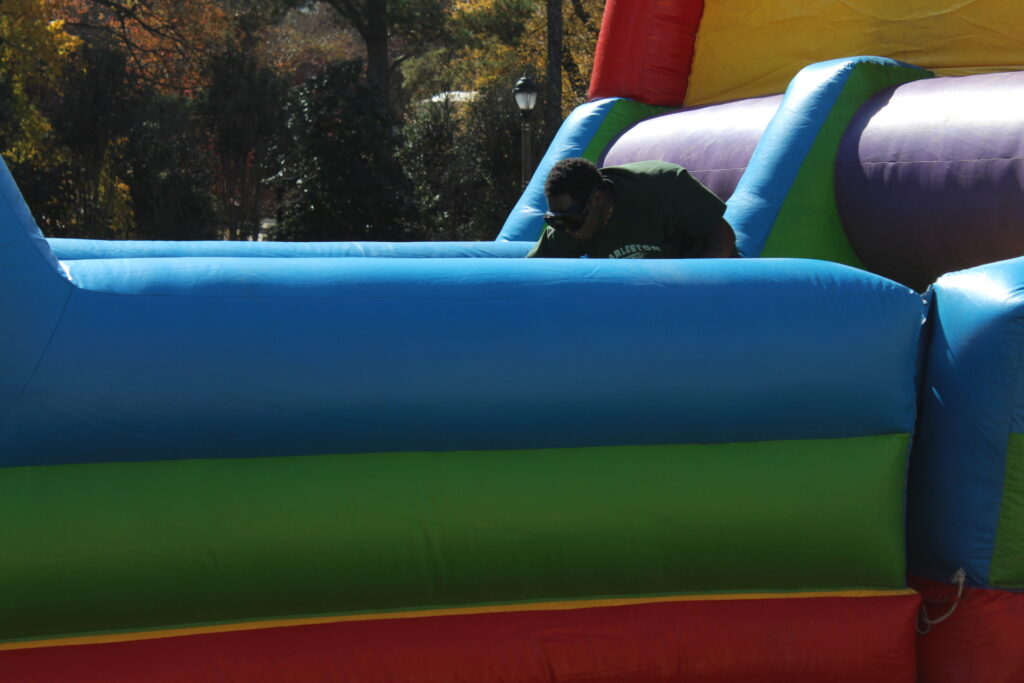Nevaeh Brown
College is usually the prime time for people in their late teens and early twenties to start drinking alcohol. With off-campus parties and college campuses being half a mile from liquor and package stores, the existence of liquor is inevitable. As a college student, it’s imperative to know how to be safe with alcohol.
The week of Nov. 6 was Alcohol Awareness Week. On Wednesday, Nov. 8, the University Recreation’s Health Education peer educators held an obstacle course where participants were instructed to wear a pair of goggles that emulated the visual effects of being inebriated.
The obstacle course was an extreme demonstration of how intoxication can limit the range of motion and sometimes an individual’s mobility in general.
“We’re raising awareness and advocating for safe drinking by showing the consequences of being intoxicated with these goggles,” said Peer Educator William Jackson.
Participants were solo or in pairs. However, the obstacle course was not treated as a race and there was no timer or time to beat. There was just a self-imposed will to make it down that inflatable slide.
Participants said they were dizzy while wearing the disoriented goggles.
“[My vision] wasn’t blurred; it was just, in a sense, disoriented just made it a bit difficult to do the obstacle course,” said graduate student Ijore Trice.
Now, after physically bringing attention to the existence of college students’ consumption of alcohol and how to be conscious of the effects of alcohol, the same knowledge from an alcohol screening questionnaire is available on the University’s health resources website.
With the screening questionnaire, these questions can be answered by an individual about themselves or someone they care about about the potential abuse of alcohol.
In turn, it gives suggestions on how to limit alcohol consumption for the consideration of safe drinking.
Alcohol consumption can cause issues for young adults, especially on college campuses, like academic issues, assault of all kinds, and a development of an alcohol use disorder.
The National Institute on Alcohol Abuse and Alcoholism states that 1 in 4 students in the age range of 18-22 report to have suffered academic struggles due to alcohol. In the guise of binge drinking, 40% of participants in this national survey had a nearly six times higher chance of experiencing a decline in academic performance such as a failing project or test.
Of the same statistic, 64% that are surveyed have engaged in binge drinking and have been five times more likely to have missed a class.
It’s been asserted that around 13% of college-aged students have experienced physical symptoms such as shakiness or dizziness, and even behavioral symptoms such as compulsiveness and agitation.
UWG provides online resources that stress the aversion to underage drinking and for students 21 years old and older to be responsible with the amount of alcohol they consume.
You may also like
-
UWG Fails to Protect Student Safety From Radical Conservative Rhetoric Under the Guise of Free Speech
-
UWG’s Ingram Library Hosts Pop-Up Study Spot to Help Students Prepare for Finals Week
-
UWG Offers Mental Health Support And Academic Services To Maintain Student Success During Finals Week
-
UWG Alumnus Shares His Experience Exploring the Underground Flood Channels of Las Vegas
-
Georgia Students Simulate the Struggles of Dementia
